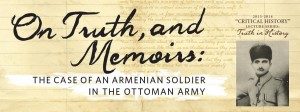April 17 lecture to commemorate anniversary of Armenian Genocide
 To mark the 99th anniversary of the Armenian Genocide, Clark University‘s Strassler Center for Holocaust and Genocide Studies will present a lecture by Professor Taner Akçam. “On Truth and Memoirs: The Case of an Armenian Soldier in the Ottoman Army” will explore the subject of a vigorous debate over the authenticity of a memoir recently published in Turkey.
To mark the 99th anniversary of the Armenian Genocide, Clark University‘s Strassler Center for Holocaust and Genocide Studies will present a lecture by Professor Taner Akçam. “On Truth and Memoirs: The Case of an Armenian Soldier in the Ottoman Army” will explore the subject of a vigorous debate over the authenticity of a memoir recently published in Turkey.
This lecture and discussion is free and open to the public. It will begin at 7:30 p.m., Thursday, April 17, in Tilton Hall at the Higgins University Center, 950 Main St.
Akҫam will discuss the case of Sarkis Torossian who served as a lieutenant in the Ottoman Army during World War I. According to his memoir, Torossian was a graduate of a military college and a decorated Ottoman officer who served at Gallipoli and other important battle fronts. Learning that his parents and sister were deported and died in the Armenian Genocide, Torossian changed allegiance. He joined the Arab rebellion in Palestine and Syria and fought with a French battalion against Kemalist forces in Cilicia. Akçam will consider the veracity of Torossian’s account and interpret the public debate surrounding the memoir in Turkey. Turkish scholars Ayhan Aktar and Edhem Eldem will comment and respond.
Torossian immigrated to the United States in 1920. In 1947, he published his memoirs in English, “From Dardanelles to Palestine: a true story of five battle fronts of Turkey.” Following the Turkish translation published in 2012, reactions in the Turkish press have been intense. Some discredited the memoir as fabricated. Others championed its authenticity. Akҫam will discuss the veracity of Torossian’s account and interpret the public debate surrounding the memoir in Turkey.
A pre-lecture reception, hosted by The Friends of the Armenian Chair at Clark University, will begin at 6 p.m. in the Lurie Conference Room at the Higgins University. Those planning to attend are asked to RSVP to Jdefronzo@clarku.edu.
A professor of history at Clark University, Taner Akçam holds the Robert Aram & Marianne Kaloosdian and Stephen and Marian Mugar Chair in Armenian Genocide Studies at the Strassler Center. An internationally recognized human rights activist, he was one of the first Turkish intellectuals to recognize and openly discuss the Armenian Genocide. He is the author of several books, most recently, “The Young Turks’ Crime Against Humanity: The Armenian Genocide and Ethnic Cleansing in the Ottoman Empire” (2012), which earned the Middle East Studies Association Albert Hourani Book Award (2013) and was named one of the year’s (2012) best books on the Middle East by Foreign Affairs.
This event is part of the 2013-2014 “Critical History” lecture series at the Strassler Center. For more information, visit clarku.edu/holocaust online, or call 508-793-8897.
Scholarship about genocide, mass atrocities, and crimes against humanity and their prevention stands at the core of the Strassler Center for Holocaust and Genocide Studies. Home to a uniquely rich undergraduate program and a landmark doctoral program, the Strassler Center is the first and only institute of its kind. Founded in 1998, the Strassler Center has now gained international stature. The Center’s growth and development demonstrate how a small research university can achieve excellence and renown.
Founded in 1887 in Worcester, Massachusetts, Clark University is a liberal arts-based research university addressing social and human imperatives on a global scale. Nationally renowned as a college that changes lives, Clark is emerging as a transformative force in higher education today. LEEP (Liberal Education and Effective Practice) is Clark’s pioneering model of education that combines a robust liberal arts curriculum with life-changing world and workplace experiences. Clark’s faculty and students work across boundaries to develop solutions to complex challenges in the natural sciences, psychology, geography, management, urban education, Holocaust and genocide studies, environmental studies, and international development and social change. The Clark educational experience embodies the University’s motto: Challenge convention. Change our world.


